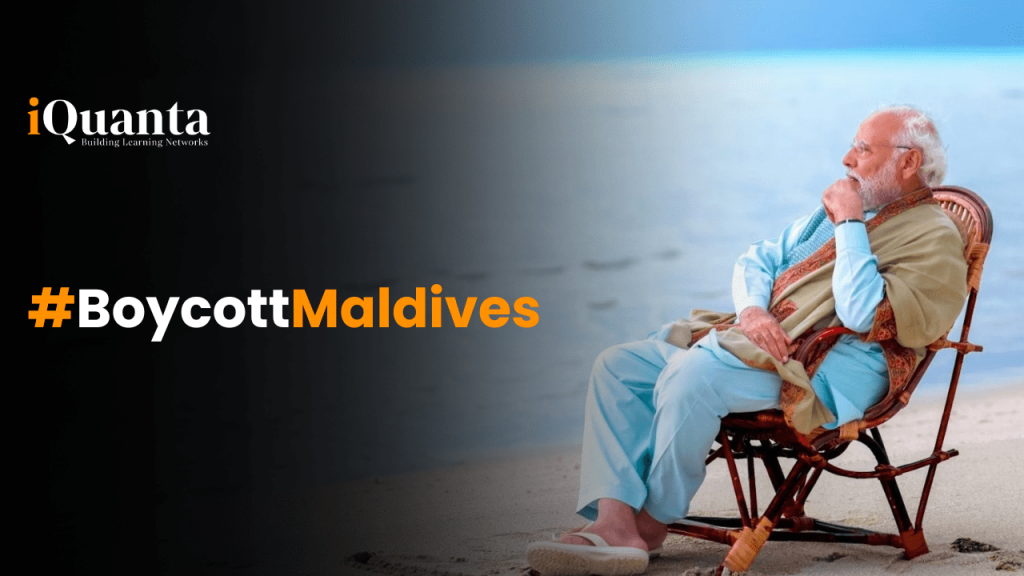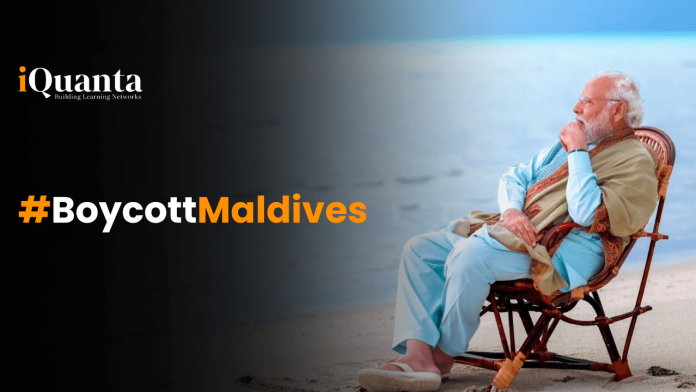
Genre : Socio-Political
One of the top travel locations in the world for sun, surf, and sustainability is the Maldives. Up until December 2023, the majority of visitors to the Maldives were from India. The Maldives Tourism Ministry reports that 2,09,198 visitors were from India. While visitors from China and Russia were 1,87,118 and 2,09,146, respectively.
But 2024 did not get off to a good start for the Maldives. During PM Modi’s visit to Lakshadweep, the Maldives deputy cabinet ministers Mariyam Shiuna, Malsha Shareef, and Mahzoom Majid made disparaging statements about him while marketing the island as a tourist destination for Indians.
The comments have hurt the island nation since, according to Indian tour companies, there are “no new enquiries by people” to travel there. There has been a noticeable effect on Maldives bookings, with many Indian travellers cancelling as well. Even though many Indians claim to have cancelled their scheduled vacations, MakeMyTrip’s founder, Deep Karla, stated that “there has been no mass cancellation of planned holidays by Indians to the island nation.”

Additionally, MakeMyTrip revealed that since PM Modi’s January 2 visit to Lakshadweep, on-platform searches for the island have increased by 3,400%. MakeMyTrip launched the ‘Beaches of India’ campaign, offering a range of bargains and discounts to encourage travellers to visit beaches across the country, in response to the significant surge in interest in Indian beaches and the big search response for the destination.
Amid the dispute, social media users began to use the hashtag #BoycottMaldives, and the Indian Association of Tour Operators anticipates that this will have a bigger effect in the following 20 to 25 days.
There has not been any investigation on the Maldives, mysteriously. Sudden dips are present. A payment made will not be refunded to the payer. Rajiv Mehra, head of the Indian Association of Tour Operators, stated, “We anticipate that people will not make travel plans to the Maldives.
Possible Repercussions of a Boycott
There could be serious economic consequences for the Maldives if Indian tourists continue to boycott the island nation:
- Revenue Loss: More than 40% of the Maldives’ GDP comes from tourism. A reduction in Indian tourists, who make up about 20% of all visitors, would result in a significant loss of revenue, which would have an effect on employment, infrastructure development, and commercial establishments.
- Reputational Damage: The Maldives’ standing as a popular travel destination may suffer because of unfavourable press surrounding the boycott. This might discourage visitors from other nations as well, worsening the economic effects.
- Lost Opportunity: The middle class in India is expanding quickly, creating a considerable demand for upscale travel. A boycott would prevent the Maldives from realizing this potential, which would harm their chances of long-term development.
Other concerns
Concerns Over Price and Value: The Maldives is known for being an opulent and pricey vacation spot. Budgets have been further stretched by recent increases in lodging, dining, and entertainment costs, especially for Indian visitors whose rupee is depreciating.
Environmental Considerations: Mass tourism has affected the Maldives’ delicate environment. Indian tourists who cared about the environment were concerned about overfishing, poor waste management, and coral bleaching.
Cultural Sensitivity Issues: A number of Indian visitors said that they were treated unfairly or with disdain because of their nationality or cultural heritage. The idea of a lack of cultural awareness contributed to the boycott movement.
Maldives tourism has unexpectedly been impacted by India’s uneasy response to the ministers’ comments and the boycott’s effects. Because the three ministers made derogatory remarks about Prime Minister Modi on Sunday, the Maldives government fired them.
Finding Common Ground
Resolving worries: The Maldivian government and travel sector need to take proactive measures to resolve Indian visitors’ worries. This entails combating price increases, putting sustainable methods into place, and encouraging service providers to be sensitive to cultural differences.
Establishing Trust
Rebuilding trust with Indian tourists can be facilitated by open communication and transparency about pricing, environmental measures, and staff training on cultural sensitivity.
Encouraging Responsible Tourism: Indian tourists and the Maldives may work together to encourage environmentally conscious and culturally sensitive tourism activities.

